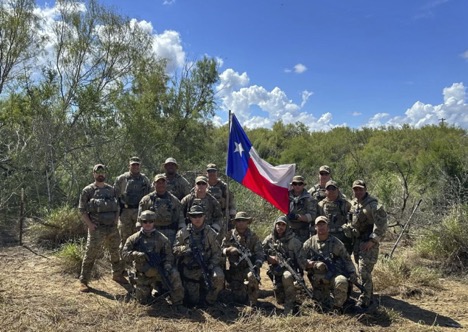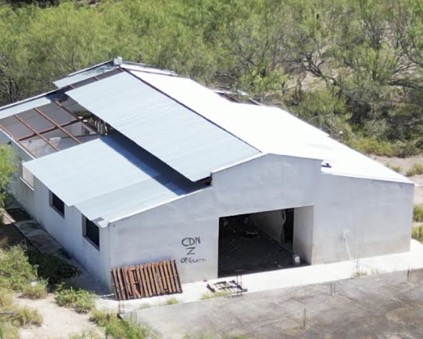NEAR FRONTON, Texas — Dawn was breaking on Monday as a Texas Rangers commander spoke to a heavily armed assembly of state police and Texas military personnel, much like a World War II military commander pep-talking soldiers about to invade an enemy-held Pacific Island.
It so happened that the Texans also were about to invade an enemy-held island, this one being a 170-acre, mile-long land mass in the middle of the Rio Grande. The declared enemy: ultra-violent Mexican cartels that have occupied and used it with impunity to smuggle cocaine, heroin, fentanyl, weapons, and illegal immigrants, all while shooting at American cops, riddling Border Patrol boats with bullets, and intimidating Texas farmers, ranchers, and the 180 residents of the isolated Texas riverfront village of Fronton.
Correction: In the video, a map is used that identifies the incorrect island as Fronton Island. View our correction with an updated map.
But no more after Monday, Texas Gov. Greg Abbott recently decided in ordering his Texas military force and state police to retake “Fronton Island” by force and to hold it, come what may. With D-Day about to start, the Rangers officer dished advice and encouragement to his force.
We have medical evacuation plans and extra blood on hand “in case we do get engaged and someone is shot or something,” he told the gathered men, some of whom shifted from one foot to another or repositioned their M-4 rifles.

“Let’s keep a close eye on those structures that are up there that have that height advantage on us,” he warned of the burned out, bullet-pocked structures up on a Mexican side bluff overlooking Fronton Island. They were often used as sniper’s perches, with many marked by spray-painted cartel acronyms.
“We have not seen people in there this morning, but we know that that’s what they’re used for.”
Because an improvised explosive was found on Fronton Island last month amid a stash of semi-automatic rifles and ammunition, don’t disturb backpacks or piles of clothes as you secure the island today, he warned, because there’s a fair chance they’re now booby-trapped. Mark it and call one of three bomb squads on call.
A Texas Rangers captain interjected to tell the troops not to take it personally if a typical eruption of combat between warring cartel factions over there happened to send rounds their way. Don’t automatically just shoot back.
“When those guys engage, we have a lot of bullets fly our way,” the captain explained. “It’s not directed fire, so just be aware of that. If they start firing on someone over there, you’ll kind of just want to take some cover. Bullets have definitely flown over our heads.”

But if they do direct fire at any of you while you’re taking the island, the first officer warned, make sure you don’t kill a Mexican soldier by accident to avoid international controversy, maybe even a Mexican extradition and trial. If fire comes from cartel gunmen fleeing a losing gun battle, as often happens, “That will initiate a large response from us, rightfully so,” the Ranger said. And, oh yeah, watch out for Africanized bees found on the island, he added. “They’re aggressive.”
When the invasion pep talk ended and the sun was spreading orange rays of light, dozens of heavily armed men, including some military special forces personnel who refused to be photographed, boarded roaring convoys of all-terrain vehicles and invaded Fronton Island.
With police drones scouting the brush ahead for gunmen, they ground through mud left by a rare overnight rainfall. The officers were sweating from humidity, body armor, and stress, trying to familiarize themselves with the island where many will spend their future shifts for months or even years to come. Depending.
The idea was for these vanguards to secure Fronton Island enough now to have Texas National Guard engineers go in with heavy earth-moving machinery to completely denude its thick, covering blanket of vegetation, fortify its newly barren length with concertina wire, and deny its future use to these cartels by force of arms. It is the third and largest Rio Grande island that Texas has seized in 2023. The earlier two were taken in the Eagle Pass area, mainly to deny their use by illegal immigrants.
All the national media was in Eagle Pass Monday to monitor illegal immigration. The Texas seizure of Fronton Island, however, highlights a consequence of the overall border crisis that went largely unnoted but demands equal attention: While Border Patrol agents have been busy processing illegal immigrants for three years, the cartels have gone unchecked.
Why Texas Invaded a Large Rio Grande No-Man’s Land Island
According to local, state, and federal law enforcement officials, the two extraordinarily murderous rival cartels that control or fight for Fronton Island — the Gulf Cartel and Cartel del Noreste (CDN) -- reigned over this part of South partly because the U.S. and Mexico forgot long ago which one owns it.
U.S. and Mexican military and law enforcement alike avoided the diplomatic risk of working on the other’s possible territory without requisite permission.
“Ownership has always been an issue for the State of Texas,” said Mike Salinas, a recently retired Border Patrol agent of 30 years in the immediate region. “And as far as Border Patrol is concerned, it was always a ‘let’s not get on there and find out’ [if Mexico owned the island] because the optics of that whole thing might open up a big old Pandora’s Box of holy moly.”
That ambiguity spiked the island’s real estate value as a haven for operatives fleeing Mexican military crackdowns or American law enforcement chasing them south. In fact, local residents and cops say the whole region became a major drug trafficking corridor because, with police agencies shying away from direct action, the cartels stashed drugs for smuggling northward and brought cash and weapons southbound over it.

Furthermore, the cartel scouts could easily monitor the only paved road that U.S. cops could drive to Fronton to time their load moves. Gunmen became so confident in their immunity from capture on either side that they lost any reluctance to shoot at police. In November 2016, gunmen on the island opened fire on Texas Department of Public Safety (DPS) troopers surveilling them, wounding one in an ensuing gun battle. In 2019, someone fired more than 50 rounds at a patrolling Border Patrol boat, riddling it but miraculously wounding no one. Fatal shootings and body discoveries, though, are not uncommon on the Fronton-area stretch of river.
Long before the current mass migration crisis started in 2021, cartel “lead or silver” offers had intimidated almost everyone who lives in the town of Fronton on the Texas mainland, especially property owners whose land fronts the Rio Grande. Cartel gunmen are bold here, showing no compunction about firing on federal and local police officers.
One 80-year-old lifelong, third-generation Fronton resident, whose property does not front the river but whose fence had just been torn open a week earlier by a marijuana trafficker who crashed there in a police chase, told me he hadn’t gone near his river neighbor’s property two hundred yards away — in 30 years.
“I’m afraid,” he responded when I asked why. When I pressed for more, he pivoted to the fact that I was filming the fence gash with my phone as we spoke.
“I know you’re filming me,” he incorrectly accused me. I insisted that I hadn’t filmed his face, nor would I identify him.
“You’d better not, because, you know, I’ll sue you,” he responded, abruptly walking away.
“It’s an island of death,” said Jaeson Jones, a retired captain in DPS’s intelligence division who worked against Mexican cartels for many years and knows the area well. “It’s dangerous, man. It really is.”
Especially now that Border Patrol is off the line, Jones said, and the cartels are now cashing in, moving immigrants over. Indeed, each night hundreds of immigrants cross through the area of Fronton. Recently, eight parents who brought single children over through the Fronton Island area told me they’d paid $9,000 for the cartel to smuggle them up from Honduras. Two parents who brought one child said they paid the cartel $15,000 for the journey.
Jones said the cartels are fighting over the lucrative new trade over the island’s east side or elsewhere through the area. He pointed to the September 10 cartel shootings of seven people, among them American citizens, who drove across the front lines in nearby Ciudad Miguel Aleman.
Texas DPS Regional Director Victor Escalon, who is overseeing the Fronton Island seizure, explained that Texas decided to act now because physical insecurity in the region has grown even worse with the mass migration crisis.
“The federal government is not able to cover all these areas and provide the safety and security of landowners who are in Texas, bottom line,” Escalon said. “When you have a land owner out here saying, ‘hey man, I’m out here feeding my cows and I see three men coming across with backpacks and they’re armed and why do I have to live like that?’ Well, this is the answer, and I call it being pro-active.”
Before Texas could take the island, the old issue of ownership first had to be settled, as with the two smaller islands. Texas Land Commissioner Dawn Buckingham ordered surveys, which found all of it belonged to Texas.
“It has been a joy and pleasure making Texas bigger for the last six months,” Buckingham quipped recently on George Rodriguez’s San Antonio radio show El Conservador. “Watch out Alaska, here we come.”
But not everyone is optimistic that the Texas effort and probably high expense of clearing the island and defending it will end the area’s problems. Other large, thickly vegetated islands are situated across from Fronton.
“All it’s going to do is do away with an island,” said Salinas, the 30-year retired Border Patrol agent. “I think they’ll still be able to move whatever commodity north or south. It’s going to be a speed bump for them [the cartels], in my opinion. They have the resources, money, and time. They’re not unionized, and they’re not shift workers.”
DPS Regional Director Escalon accepts the possibility of a prolonged island campaign in the Rio Grande.
“This is a lifelong mission, a lifelong operation. It never ends,” Escalon said. “They’re going to move, and if they move somewhere else, we’ll identify it and just follow them everywhere up and down the river. The way we look at this is, this is forever.”
